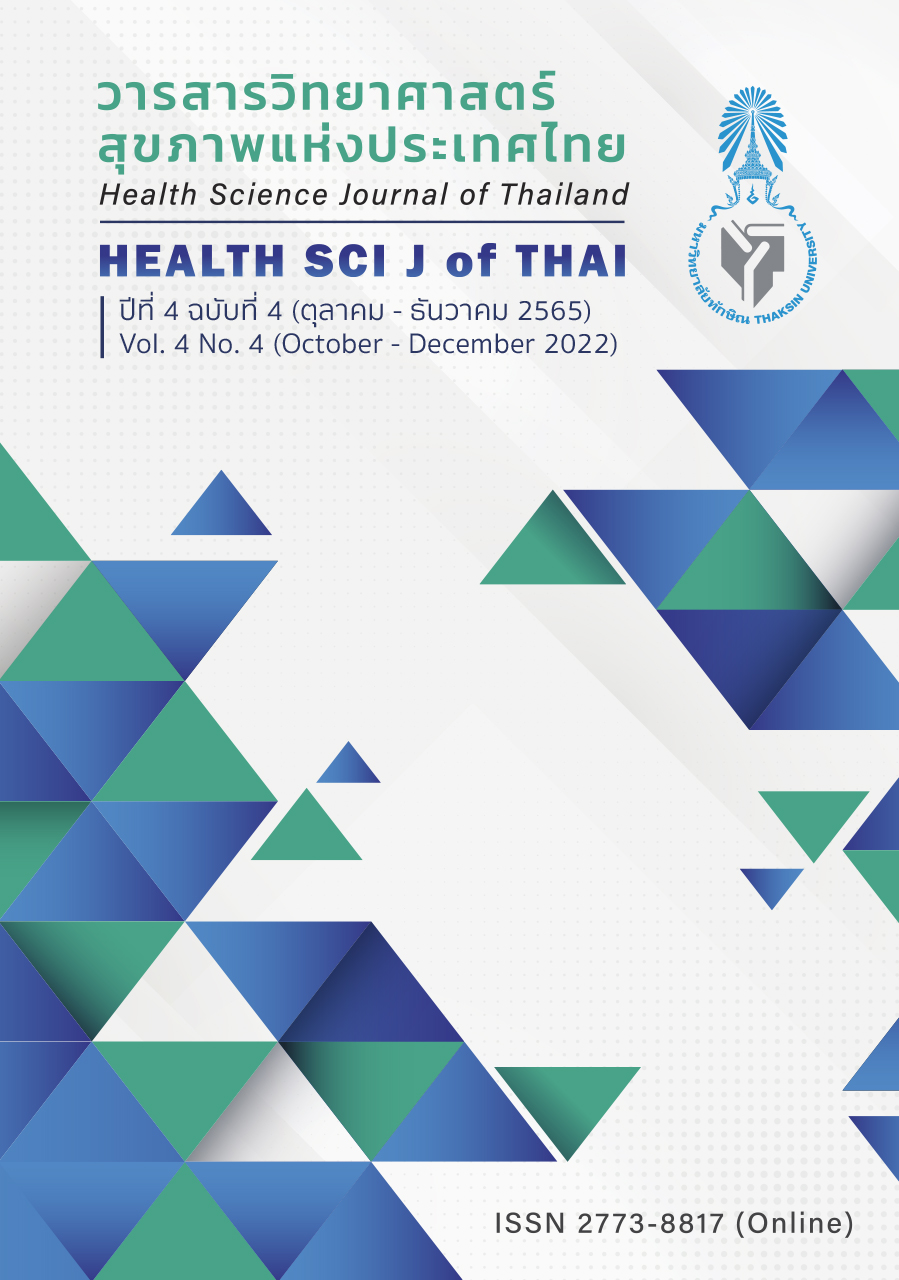Relationships between Smartphone Addiction, Depression, Stress, and Academic Performance among Students at Sakon Nakhon Rajabhat University
Main Article Content
Abstract
This is a cross-sectional study that aimed to 1) determine smart addiction and 2) investigate relationships between smartphone addiction, depression, stress, and academic performance among students at Sakon Nakhon Rajabhat University. 345 students at Sakon Nakhon Rajabhat University were sampled using the multistage sampling technique. The data were collected using a self-administered questionnaire and were analyzed using a descriptive statistic. The relationships between depression, stress, academic performance, and smartphone addiction were tested using Binary logistic regression. The results showed that 195 students were addicted to smartphone that was at the percentage of 56.5 and relationships between smartphone addiction and severe stress (OR = 9.84; 95%CI: 4.12 – 23.50), high stress (OR = 3.42; 95%CI: 1.58 – 7.40), depression (OR = 2.12; 95%CI: 1.28 – 3.53), and GPA < 3.00 (OR = 1.95; 95%CI: 1.12 – 3.40) were significant at the level of 0.05. Recommendations from the study revealed that there should be screening for stress and depression in the students, especially the ones who had smartphone addiction. Furthermore, to protect the health problems, there should be an arrangement of activities about self-management towards using the smartphone for entertainment and relaxation.
Article Details

This work is licensed under a Creative Commons Attribution-NonCommercial-NoDerivatives 4.0 International License.
References
National Science and Technology Development Agency. Smart Phone [internet]. 2012. [Cited 2018 September 19], Available from: http://www.thaiglossary.org/node/59286. (In Thai)
Electronic Transactions Development Agency. Thailand internet user behavior. 2020. [internet]. 2021. [Cited 2021 May 21], Available from: https://www.etda.or.th/th/newsevents/pr-news/ETDA-released-IUB-2020.aspx. (In Thai)
Thomée S, Härenstam A, Hagberg M. Mobile phone use and stress, sleep disturbances, and symptoms of depression among young adults-a prospective cohort study. BMC public health. 2011; 11(1): 1-11.
Wei F-YF, Wang YK, Klausner M. Rethinking college students' self-regulation and sustained attention: Does text messaging during class influence cognitive learning? Communication Education. 2012; 61(3): 185-204.
Rosen LD, Carrier LM, Cheever NA. Facebook and texting made me do it: Media-induced task-switching while studying. Computers in Human Behavior. 2013; 29(3): 948-958.
King ALS, Valença AM, Silva AC, Sancassiani F, Machado S, Nardi AE. “Nomophobia”: Impact of cell phone use interfering with symptoms and emotions of individuals with panic disorder compared with a control group. Clinical practice and epidemiology in mental health. 2014; 10: 28-35.
Tindell DR, Bohlander RW. The use and abuse of cell phones and text messaging in the classroom: A survey of college students. College Teaching. 2012; 60(1): 1-9.
Duke É, Montag C. Smartphone addiction, daily interruptions and self-reported productivity. Addictive Behaviors Reports. 2017; 6: 90-95.
Kwon M, Lee J-Y, Won W-Y, Park J-W, Min J-A, Hahn C, et al. Development and Validation of a Smartphone Addiction Scale (SAS). PLOS ONE. 2013; 8(2): e56936.
Lemeshow S, Hosmer DW, Klar J, Lwanga SK, Organization WH. Adequacy of sample size In health studies: Chichester: Wiley; 1990.
Chuemongkon W, Inthitanon T, Wangsate J. Impact of Smartphone and Tablet Use on Health and Academic Performance of Pharmacy Students at Srinakharinwirot University. Srinagarind Medical Journal. 2019; 34(1): 90-98. (In Thai)
Charoenwanit S, Soonthornchaiya R. Development of smartphone addiction scale: Thai short version (SAS-SV-TH). Journal of Mental Health of Thailand. 2020; 27(1): 25-36. (In Thai)
Child and Adolescent Mental Health Rajanagarindra Institute. Clinical practice guideline for adolescents with depression: Bangkok: Beyond Publishing; 2021. (In Thai)
Mahatnirunkul S, Pumpaisalchai W, Tapanya P. The Construction of Suan Prung Stress Test for Thai Population. Journal of Suanprung Psychiatric Hospital. 1998; 13(3): 1-20. (In Thai)
Chen B, Liu F, Ding S, Ying X, Wang L, Wen Y. Gender differences in factors associated with smartphone addiction: a cross-sectional study among medical college students. BMC psychiatry. 2017; 17(1): 1-9.
Orprasert P, Suggaravetsiri P. Prevalence and factors associated with smartphone addiction behavior among high school students in the municipality of Muang district Kalasin province. KKU Journal for Public Health Research. 2019; 12(4): 30-39. (In Thai)
Pothimas N, Meepring S, Youjaiyen M. The Relationship among Stress related to Online Learning, Resilience, and Coping of Nursing Students during COVID-19 Pandemic. Journal of Health and Nursing Research. 2021; 37(3): 142-154. (In Thai)
Haug S, Castro RP, Kwon M, Filler A, Kowatsch T, Schaub MP. Smartphone use and smartphone addiction among young people in Switzerland. Journal of behavioral addictions. 2015; 4(4): 299-307.
Cho HY, Kim DJ, Park JW. Stress and adult smartphone addiction: Mediation by self-control, neuroticism, and extraversion. Stress and Health. 2017; 33(5): 624-630.
Kaewkanta P, Rungreangkulkij S. Prevalence of Depression in Higher Education Students In Chiangrai Province. Nursing Journal. 2015; 42(4): 48-64. (In Thai)
Matar Boumosleh J, Jaalouk D. Depression, anxiety, and smartphone addiction in university students-A cross sectional study. PloS one. 2017; 12(8): e0182239.
Alhassan AA, Alqadhib EM, Taha NW, Alahmari RA, Salam M, Almutairi AF. The relationship between addiction to smartphone usage and depression among adults: a cross sectional study. BMC psychiatry. 2018; 18(1): 1-8.
Silangam W. Dangers of Smartphone Addiction HCU journal of health science. 2018; 22 (43-44): 193-204. (In Thai)
Hawi NS, Samaha M. The relations among social media addiction, self-esteem, and life satisfaction in university students. Social Science Computer Review. 2017; 35(5): 576-586.
Demirci K, Akgönül M, Akpinar A. Relationship of smartphone use severity with sleep quality, depression, and anxiety in university students. Journal of behavioral addictions. 2015; 4(2): 85-92.


